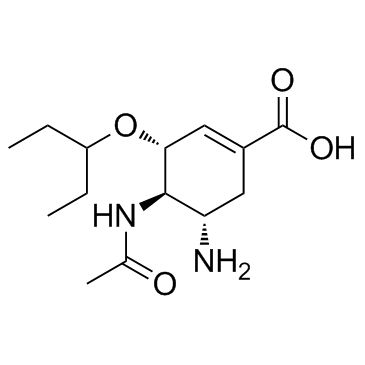187227-45-8
| Name | oseltamivir acid |
|---|---|
| Synonyms |
(3R,4R,5S)-4-(acetylamino)-5-ammonio-3-(pentan-3-yloxy)cyclohex-1-ene-1-carboxylate
Oseltamivir carboxylate Ro 64-0802 (3R,4R,5S)-4-acetamido-5-amino-3-pentan-3-yloxycyclohexene-1-carboxylic acid 1-Cyclohexene-1-carboxylic acid,4-(acetylamino)-5-amino-3-(1-ethylpropoxy)-,(3R,4R,5S) G39 GS4071 (3R,4R,5S)-5-Amino-4-[(E)-(1-hydroxyethylidene)amino]-3-(3-pentanyloxy)-1-cyclohexene-1-carboxylic acid (3R,4R,5S)-4-Acetamido-5-amino-3-(3-pentanyloxy)-1-cyclohexene-1-carboxylic acid Oseltamivir acid (3R,4R,5S)-4-Acetamido-5-amino-3-(1-ethylpropoxy)cyclohex-1-ene-1-carboxylic acid Oseltamivir (acid) |
| Description | GS 4104, the ethyl ester prodrug of GS 4071, is an inhibitor of influenza virus neuraminidase with an IC50 of approximately 100 nM. |
|---|---|
| Related Catalog | |
| Target |
Influenza A and B[1] |
| In Vitro | Oseltamivir acid inhibits virus replication in vitro and in vivo. Influenza B and A/H1N1 viruses appeare to be sensitive to Oseltamivir (mean B IC50 value: 13 nM; mean H1N1 IC50 value: 1.34 nM), while A/H1N2 and A/H3N2 viruses are more sensitive to Oseltamivir (mean H3N2 IC50 value: 0.67 nM; mean H1N2 IC50 value: 0.9 nM)[1]. In neuraminidases inhibition assays with influenza A viruses, the median 50% inhibitory concentration (IC50) of RWJ-270201 (approximately 0.34 nM) is comparable to that of Oseltamivir carboxylate (0.45 nM) For influenza B virus isolates, the IC50 of RWJ-270201 (1.36 nM) is comparable to that of Zanamivir (2.7 nM) and less than that of Oseltamivir carboxylate (8.5 nM)[2]. |
| In Vivo | Oseltamivir (0.1, 1, or 10 mg/kg/day, twice daily by oral gavage) produces a dose-dependent antiviral effect against Vietnam/1203/04 (VN1203/04) virus. The 5-day regimen at 10 mg/kg/day protects 50% of mice; deaths in this treatment group are delayed and indicated the replication of residual virus after the completion of treatment. Eight-day regimens improved Oseltamivir efficacy, and dosages of 1 and 10 mg/kg/day significantly reduced virus titers in organs and provided 60% and 80% survival rates, respectively[3]. In the pharmacokinetic study, after the oral administration of 1,000 mg/kg Oseltamivir, peak plasma concentrations are reached at 2 h postdose for Oseltamivir and 8 h for Oseltamivir carboxylate (OC). Rats are exposed to Oseltamivir over the whole sampling interval and had a ~2.7-fold-higher rate of exposure to OC than Oseltamivir. In CSF, peak concentrations are reached at 2 h postdose for Oseltamivir and 6 h for OC. CSF/plasma exposure ratios (AUC0-8 h) are ~0.07 for Oseltamivir and 0.007 for OC. In perfused brain samples, peak concentrations are reached at 8 h postdose for Oseltamivir and 6 h for OC. Brain/plasma exposure ratios (AUC0-8 h) of ~0.12 for Oseltamivir and 0.01 for OC are recorded. Corresponding CSF/brain exposure ratios ranged between ~0.55 and 0.64 for both analytes. A further group of animals that received a single oral administration of Oseltamivir at a lower dose produced similar results[4]. |
| Animal Admin | Mice[3] Female 6-week-old BALB/c mice are anesthetized with isofluorane and intranasally inoculated with 50 μL of 10-fold serial dilutions of VN1203/04 virus in PBS. The mouse lethal dose (MLD50) is calculated after a 16-day observation period. Oseltamivir is administered by oral gavage twice daily for 5 or 8 days to groups of 10 mice at dosages of 0.1, 1, and 10 mg/kg/day. Control (infected but untreated) mice received sterile PBS (placebo) on the same schedule. Four hours after the first dose of Oseltamivir, the mice are inoculated intranasally with 5 MLD50 of VN1203/04 virus in 50 μL of PBS. Survival and weight change are observed for 24 days. Virus titers in the mouse organs are determined on days 3, 6, and 9 after inoculation. Three mice from each experimental and placebo group are killed, and the lungs and brains are removed. The organs are homogenized and suspended in 1 mL of PBS. The cellular debris is cleared by centrifugation at 2000 g for 5 min. The limit of virus detection is 0.75 log10 EID50. For calculation of the mean, samples with a virus titer <0.75 log10 EID50/mL are assigned a value of 0. Virus titers in each organ are calculated by use of the method of Reed and Muench and are expressed as mean log10 EID50/mL±SE. Rats[4] Several studies are performed to characterize the pharmacokinetics of Oseltamivir and OC in the plasma, cerebrospinal fluid (CSF), and brain of Sprague-Dawley rats following single-dose bolus administration of Oseltamivir (intravenous [i.v.] and oral) and OC (i.v.). In the i.v. studies, nonfasted adult rats (two groups of 35 animals for each test substance) received a dose of 30 mg/kg body weight of either Oseltamivir or Oseltamivir carboxylate (OC) in aqueous solution with sodium chloride (0.9%; pH 4.0) via slow injection into the tail vein over 20 to 30 s. In both i.v. studies, pharmacokinetic sampling took place at 5 min and at 0.25, 0.5, 1, 2, 4, and 8 h postdose (four or five rats/time point). |
| References |
| Density | 1.2±0.1 g/cm3 |
|---|---|
| Boiling Point | 508.7±50.0 °C at 760 mmHg |
| Melting Point | 183-185°C |
| Molecular Formula | C14H24N2O4 |
| Molecular Weight | 284.351 |
| Flash Point | 261.5±30.1 °C |
| Exact Mass | 284.173615 |
| PSA | 101.65000 |
| LogP | 0.45 |
| Vapour Pressure | 0.0±2.8 mmHg at 25°C |
| Index of Refraction | 1.525 |
| Storage condition | -20?C Freezer, Under Inert Atmosphere |
